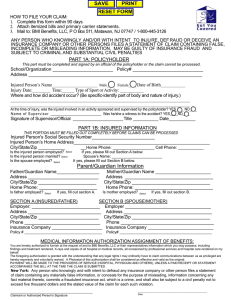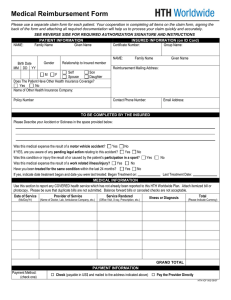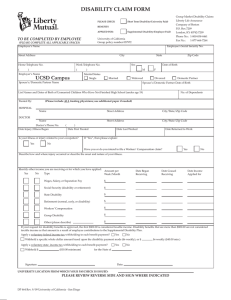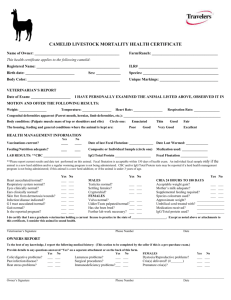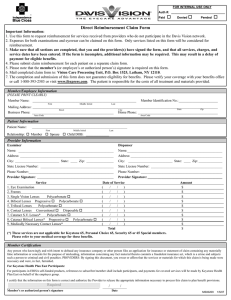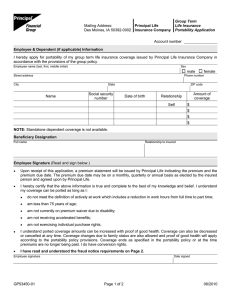ATTENDING PHYSICIAN STATEMENT
advertisement
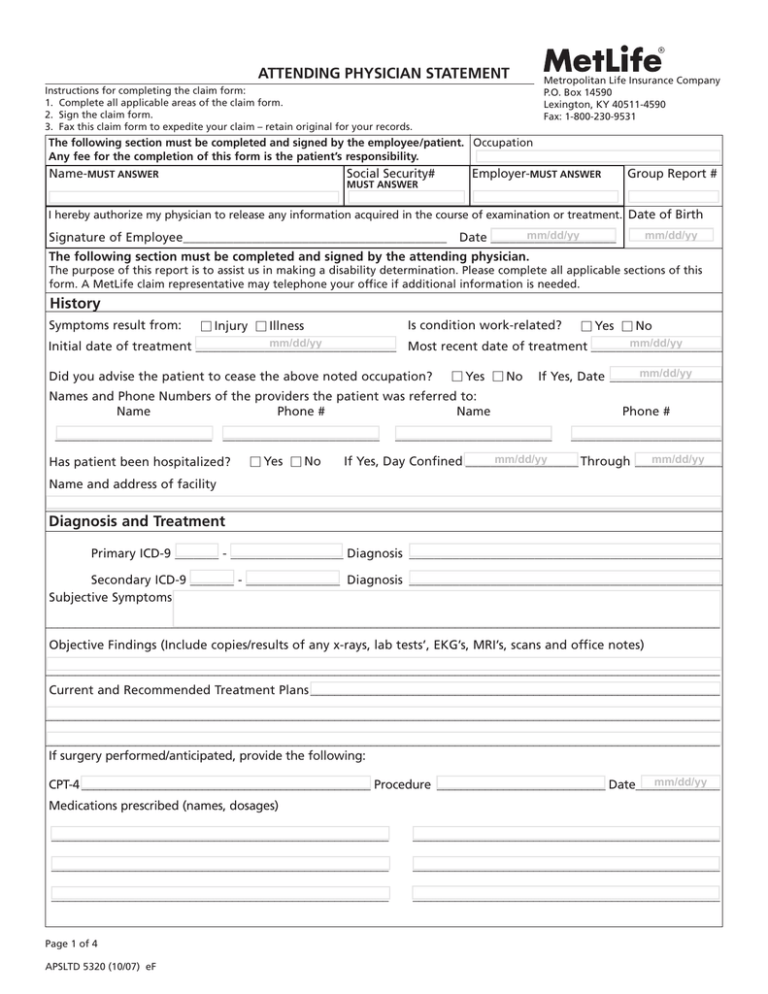
ATTENDING PHYSICIAN STATEMENT Instructions for completing the claim form: 1. Complete all applicable areas of the claim form. 2. Sign the claim form. 3. Fax this claim form to expedite your claim – retain original for your records. Metropolitan Life Insurance Company P.O. Box 14590 Lexington, KY 40511-4590 Fax: 1-800-230-9531 The following section must be completed and signed by the employee/patient. Occupation Any fee for the completion of this form is the patient’s responsibility. Name-MUST ANSWER Social Security# MUST ANSWER Employer-MUST ANSWER Group Report # I hereby authorize my physician to release any information acquired in the course of examination or treatment. Date of Birth mm/dd/yy mm/dd/yy Signature of Employee___________________________________________ Date_____________________ The following section must be completed and signed by the attending physician. he purpose of this report is to assist us in making a disability determination. Please complete all applicable sections of this T form. A MetLife claim representative may telephone your office if additional information is needed. History Symptoms result from: Injury Illness Is condition work-related? Yes No mm/dd/yy mm/dd/yy Initial date of treatment_________________________________ Most recent date of treatment______________________ Did you advise the patient to cease the above noted occupation? Yes No mm/dd/yy If Yes, Date_ __________________ Names and Phone Numbers of the providers the patient was referred to: Name Phone # Name _________________________ _________________________ _________________________ Has patient been hospitalized? Yes No Phone # ________________________ mm/dd/yy mm/dd/yy If Yes, Day Confined___________________ Through_______________ Name and address of facility Diagnosis and Treatment Primary ICD-9 _______ - __________________Diagnosis ___________________________________________________ Secondary ICD-9 _______ - _______________ Diagnosis ___________________________________________________ Subjective Symptoms ________________________________________________________________________________________________________________ Objective Findings (Include copies/results of any x-rays, lab tests’, EKG’s, MRI’s, scans and office notes) ________________________________________________________________________________________________________________ Current and Recommended Treatment Plans_____________________________________________________________________ ________________________________________________________________________________________________________________ ________________________________________________________________________________________________________________ If surgery performed/anticipated, provide the following: mm/dd/yy CPT-4_________________________________________________ Procedure_ ____________________________ Date______________ Medications prescribed (names, dosages) _________________________________________________________ _ ___________________________________________________ _ ________________________________________________________ _ ___________________________________________________ _________________________________________________________ _ ___________________________________________________ Page of 4 APSLTD 5320 (10/07) eF Name of Employee:______________________________________________ Social Security Number:_ __________________ Psychological Functions Check applicable box below Class 1 – Patient is able to function under stress and engage in interpersonal relations (no limitations) Class 2 – Patient is able to function in most stress situations and engage in some interpersonal relations (slight limitations) Class 3 – Patient is able to engage in only limited stress situations and engage in only limited interpersonal relations (moderate limitations) Class 4 – Patient is unable to engage in stress situations and engage in interpersonal relations (marked limitations) Class 5 – Patient has significant loss of psychological, physiological, personal and social adjustment (severe limitations) Remarks: What stress factors or problems with interpersonal skills have affected patient’s ability to perform, the duties of his or her job? Is patient competent to endorse checks and direct use of the proceeds? Yes No Physical Capabilities (a) Patient’s ability to: (circle) (b) Hours (check) Sit 0 1 2 3 4 5 6 7 8 Continuously Intermittently Stand 0 1 2 3 4 5 6 7 8 Continuously Intermittently Walk 0 1 2 3 4 5 6 7 8 Continuously Intermittently Patient’s ability to: (circle) ClimbYes Twist/bend/stoopYes Reach above shoulder levelYes Operate a motor vehicleYes No No No No (c) Patient’s ability to lift/carry: (check) Never Occasionally FrequentlyContinuously (d) Patient’s ability to perform repetitively: (circle) 0%1-35% 36-66% 67-100% Right Hand Left Hand Up to 10 lbs. Fine finger movements Yes No Yes No 11 to 20 lbs. Eye/hand movements Yes No Yes No 21 to 50 lbs. Pushing/pulling Yes No Yes No 51 to 100 lbs. Over 100 lbs. Dominant hand R L (e) In your opinion, why is patient unable to perform job duties? (f) Patient can work a total of_______________________________hours per day? (g) Do you expect improvement in any area? (If so please comment and give dates/timeframes.) Cardiac Functional Capacity (American Heart Association) Complete only if applicable. Class 1 (No Limitation) Class 2 (Slight Limitation) Class 3 (Marked Limitation) Class 4 (Complete Limitation) mm/dd yyyy Blood Pressure (latest reading) ________________ / ________________ as of (date) ________________ / ________________ Is patient in a cardiac rehabilitation program? Prognosis Have you advised patient to return to work? mm/dd/yy Yes If Yes, date of return_____________________________ To regular occupation Full Time Part Time To any other occupation Full Time Part Time No If Not, please explain Any work/activity restrictions applicable (please be specific) Rehab Do you suggest that the patient become involved in any of the following? Please check as many as apply. If so, was this discussed with the patient? Yes No Physical Therapy Pain Management Program Vocational Rehabilitation Occupational Therapy Work Hardening Program Psychological Counseling Cardiac Rehabilitation Job Modification Other­­­­­­­­­­­________________ Page of 4 APSLTD 5320 (10/07) eF Disability Claim Attending Physician Statement (Continued) Name of Employee: Social Security Number: Fraud Warning: Any person who knowingly and with intent to defraud any insurance company or other person files an application for insurance or a statement of claim with materially false information or conceals for the purpose of misleading, information concerning any fact material there to may be guilty of committing a fraudulent insurance act. Please see below for special notice required by state law. Alaska – A person who knowingly and with intent to injure, defraud or deceive an insurance company files a claim containing false, incomplete or misleading information may be prosecuted under state law. Arizona – For your protection Arizona law requires the following statement to appear on this form. Any person who knowingly presents a false or fraudulent claim for payment of loss is subject to criminal and civil penalties. Arkansas, Louisiana, West Virginia – Any person who knowingly presents a false or fraudulent claim for payment of a loss or benefit or knowingly presents false information in an application for insurance is guilty of a crime and may be subject to fines and confinement in prison. California – For your protection California law requires the following to appear of this form: Any person who knowingly presents a false or fraudulent claim for the payment of a loss is guilty of a crime and may be subject to fines and confinement in state prison. Colorado – It is unlawful to knowingly provide false, incomplete, or misleading facts or information to an insurance company for the purpose of defrauding or attempting to defraud the company. Penalties may include imprisonment, fines, denial of life insurance, and civil damages. Any insurance company or agent of an insurance company who knowingly provides false, incomplete, or misleading facts or information to a policyholder or claimant for the purpose of defrauding or attempting to defraud the policyholder or claimant with respect to a settlement or award from insurance proceeds, shall be reported to the Colorado divisions of insurance within the department of regulatory agencies to the extent required by applicable law. Delaware – Any person who knowingly and with the intent to injure, defraud or deceive any insurer, files a statement of claim containing any false, incomplete or misleading information is guilty of a felony. District of Columbia – WARNING: It is a crime to provide false or misleading information to an insurer for the purpose of defrauding the insurer or any other person. Penalties include imprisonment and/or fines. In addition, an insurer may deny insurance benefits if false information materially related to a claim was provided by the applicant. Florida – Any person who knowingly and with intent to injure, defraud or deceive any insurer files a statement of claim or an application containing any false, incomplete, or misleading information is guilty of a felony of the third degree. Hawaii – For your protection, Hawaii law requires you to be informed that presenting a fraudulent claim for payment of a loss or benefit is a crime punishable by fines or imprisonment, or both. Idaho – Any person who knowingly and with the intent to defraud or deceive any insurance company, files a statement of claim containing any false, incomplete, or misleading information is guilty of a felony. Indiana – A person who knowingly and with intent to defraud an insurer files a statement of claim containing any false, incomplete, or misleading information commits a felony. Kentucky – Any person who knowingly and with the intent to defraud any insurance company or other person files a statement of claim containing any materially false information or conceals, for the purpose of misleading, information concerning any fact material there to commits a fraudulent insurance act, which is a crime. Maine – It is a crime to knowingly provide false, incomplete or misleading information to an insurance company for the purpose of defrauding the company. Penalties may include imprisonment, fines or a denial of insurance benefits. Minnesota – A person who files a claim with intent to defraud or helps commit a fraud against an insurer is guilty of a crime. New Hampshire – A person who with a purpose to injure, defraud or deceive any insurance company, files a statement of claim containing false, incomplete or misleading information is subject to prosecution and punishment for insurance fraud, as provided in RSA 638:20. Page of 4 APSLTD 5320 (10/07) eF Disability Claim Attending Physician Statement (Continued) Name of Employee: Social Security Number: Fraud Warning (continued): New Jersey – Any person who knowingly files a statement of claim containing false or misleading information is subject to criminal and civil penalties. New Mexico – Any person who knowingly presents a false or fraudulent claim for payment of a loss or benefit or knowingly presents false information in an application for insurance is guilty of a crime and may be subject to civil fines and criminal penalties. Ohio – A person who with intent to defraud or knowing that he is facilitating a fraud against an insurer, submits an application or files a claim containing false or deceptive statement is guilty of insurance fraud. Oklahoma – WARNING: Any person who knowingly and with the intent to injure, defraud or deceive any insurer, makes any claim for the proceeds of an insurance policy containing any false, incomplete, or misleading information is guilty of a felony. Oregon – A person who knowingly and with intent to defraud an insurance company, files a claim containing false, incomplete or misleading information material to such claim, may be guilty of insurance fraud. Pennsylvania – Any person who knowingly and with intent to defraud any insurance company or other person files an application for insurance or a statement of claim containing any materially false information or conceals for the purpose of misleading, information concerning a fact material there to commits a fraudulent insurance act, which is a crime and subjects such person to criminal and civil penalties. Puerto Rico – Any person who knowingly and with the intention to defraud includes false information in an application for insurance or file, assist or abet in the filing of a fraudulent claim to obtain payment of a loss or other benefit, or files more than one claim for the same loss or damage, commits a felony and if found guilty shall be punished for each violation with a fine of no less than five thousands dollars ($5,000), not to exceed ten thousands dollars ($10,000); or imprisoned for a fixed term of three (3) years, or both. If aggravating circumstances exist, the fixed jail term may be increased to a maximum of five (5) years; and if mitigating circumstances are present, the jail term may be reduced to a minimum of two (2) years. Tennessee, Virginia, Washington – It is a crime to knowingly provide false, incomplete or misleading information to an insurance company for the purpose of defrauding the company. Penalties include imprisonment, fines and denial of insurance benefits. Texas – Any person who knowingly presents a false or fraudulent claim for the payment of a loss is guilty of a crime and may be subject to fines and confinement in state prison. Physician Name___________________________________________ Degree/Specialty______________________________________ Street Address City Telephone # State Fax # Zip Code Tax ID # Contact person if additional information is necessary Signature Page of 4 APSLTD 5320 (10/07) eF Date mm/dd/yy
